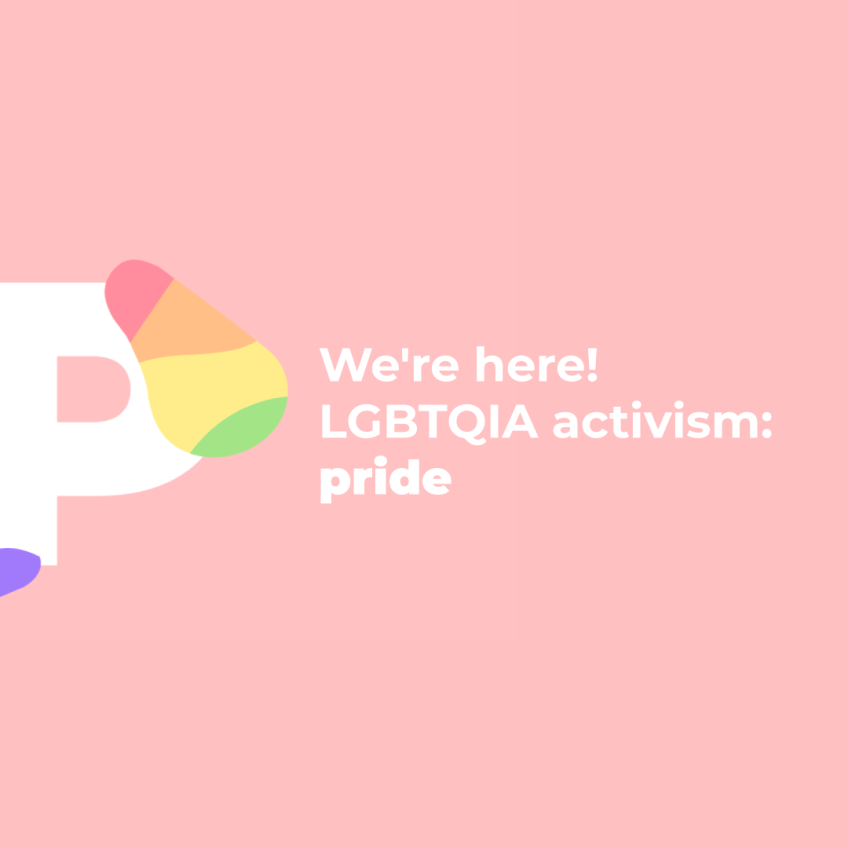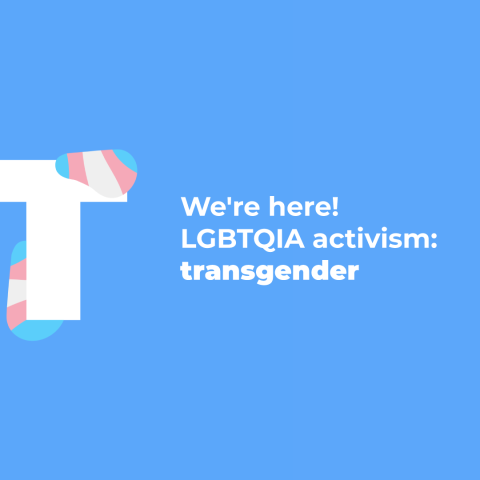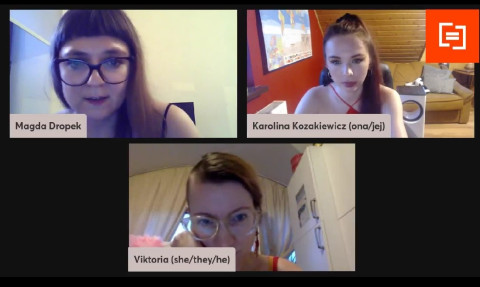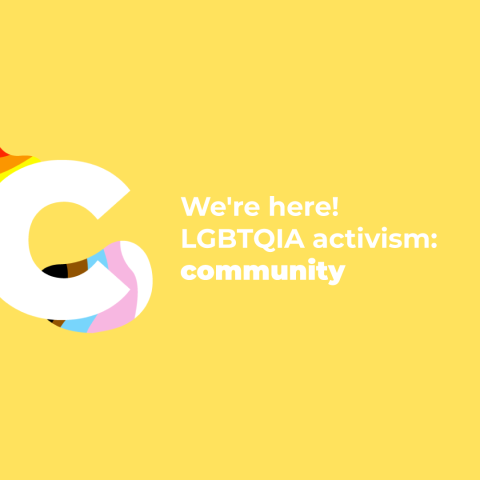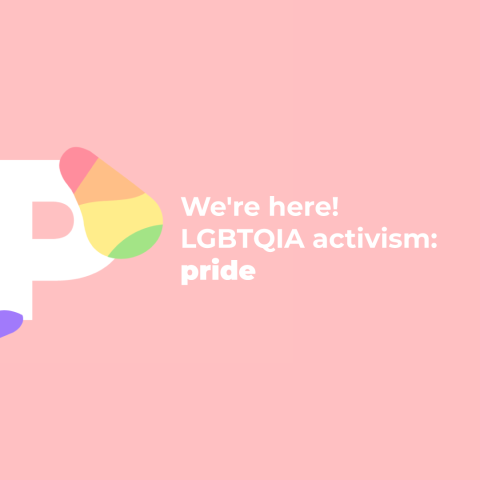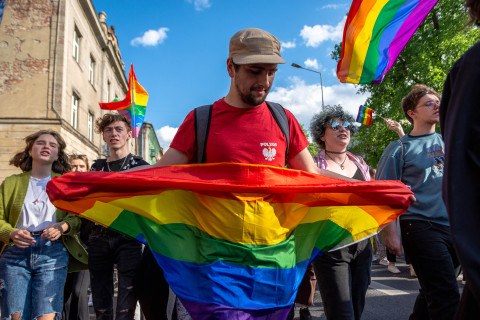Wojciech Wojtasiewicz: Who are you? What are the goals of Tbilisi Pride?
Mariam Kvaratskhelia: I am a co-founder of Tbilisi Pride and currently the director of the organization. Tbilisi Pride aims to reduce homophobia in Georgia by practicing the rights of peaceful assembly and freedom of expression. We believe that visibility politics will be able to significantly reduce homo and transphobia in the country. We organize the annual Pride Week in Tbilisi. But also every year we have long-term projects working on a daily basis for improving the human rights and equality situation of LGBTQI people.
Tbilisi Pride was founded in 2019. We are turning four years old on February 2023, so we are quite a new and young organization. During Pride Week we used to try to organize a march for dignity several times, but it was not successful, because of the attacks and far-right violence, which were not prevented or countered by the Georgian government. So actually, we have never been able to organize the march. That is why we hold the other Pride events like a quite big festival outdoors, on the private festival territory. After the 2021 July 5th violent events, we decided not to organize the March for Dignity in 2022. But even the festival became the target of the far-right in 2022. In this case, the government acted and protected the event. During the pride weeks, we also organize international conferences, big movie screenings, receptions, and so on. Unfortunately, up to this moment, it is not practically possible for us to march in the streets, to be in public spaces.
Tbilisi Pride is mainly focused on advocacy and campaigning. We are not a service provider organization. But we always refer queers to the relevant services as they often approach us because we are so visible. We also do some community empowerment work and mobilizing which in the end serves the purpose of effective advocacy and campaigning. The activities include activist camps, weekly community meetings, workshops, etc. We are running a unique project “Proud Families” which is the only project aimed at empowering family members of LGBTQI people. In terms of advocacy, we try to work with politicians, MPs, and different government institutions to push for reforms and the improvement of the protection of LGBT people’s human rights. We recently started writing policy papers and human rights reports.
Working with politicians and MPs is the most challenging issue for us, because in Georgia it is a very unpopular topic, and nobody wants to be really associated with being a champion of this issue. Even if we have a few allies in the parliament, they are not very motivated to fight for our rights. They are not passioned as we would like them to be. We have a very conservative government. It became especially hard to do activism in Georgia during the last two years. It is the same for the entire civil society. Our government and democracy were never great, but it really has gone back during the last two years, and we see some authoritarian tendencies. Last year on July 5th Tbilisi Pride’s march for dignity was attacked. Our office was destroyed, journalists were beaten up, and Pride organizers were chased and attacked. It was a tragic day, very traumatizing. Up to this moment, there has been no one, none of the organizers or the people who incited violence, punished. Only a few ordinary participants in this homophobic demonstration were fined. Up to this moment, the EU Commission and EU Delegation have been tending the government to act and to do something because it was massive violence.
Very important thing is that Georgia right now is trying to get candidate status for the EU like Ukraine and Moldova, which got it several months ago. We were given 12 very specific recommendations from the EU Commission, which we need to fulfill in order to get candidacy. There are some things about LGBT rights, but unfortunately, our government is doing something regarding other recommendations, but about our community is nothing happening. Now we are really trying to push and send a message that without touching on our issues and making some kind of policy reforms it will be impossible to get EU candidacy. We wrote a policy paper about it, and we will present it soon in parliament.
Tbilisi Pride is a very visible organization, we have thousands of followers and supporters, very active and engaging in our work. We have lots of volunteers and young people who approach us. Very often we receive messages that they need services or help, and they do not know any other LGBT organization. During the pandemic, even though we are not service providing organization, we felt there was not enough humanitarian aid provided by NGOs, therefore temporarily we also fulfilled this function, and we raised some significant amount of money from abroad, from different sources, and distributed it among the community, including transgender sex worker women, in order to cover rent, medicines, and food costs.
Did you conduct any shelters for LGBTQI people in Tbilisi?
There is a shelter in Tbilisi for 12 people and it is managed by Temida, the trans community organization. The shelter is for everyone, for the entire community. But it is a very new thing. We are very happy about it. Everyone is really trying to spread information about it, because not many people apply, which is shocking. We know that many people need it, but do not know about it.
You mentioned that one of the EU recommendations regarding candidate status for Georgia is dedicated to LGBTQI rights. What is exactly written there? What are the demands of the EU?
8th recommendation states “move swiftly to strengthen the protection of human rights of vulnerable groups, including by bringing perpetrators and instigators of violence to justice more effectively”1. We know that the EU commission is touching on the July 5th, 2021 violent homophobic events here. Also, the EU Commission prepared an opinion on Georgia’s application for membership in the European Union, where we read: “More needs to be done to protect the rights of lesbian, gay, bisexual, transgender, intersex or queer (LGBTIQ) persons in Georgia, particularly in light of the July 2021 events.”2
It is supposed to make sure that perpetrators and instigators of hate crimes are investigated and punished. And what we did within the policy paper, explain what it means, and we discussed the framework in place right now between Georgia and the EU, because we have also an association agreement and there is also association agenda, where are specific points about LGBTQI rights, what needs to be done. For example, shelter is one of these things. We really try to push for it. Even an adviser of the prime minister in human rights told us that he really wants to include LGBTQI rights in National Human Rights Strategy. This is another process, which is being renewed now, and from what we saw in the document, there every minority and vulnerable groups listed except us. We are completely ignored. Everyone was shocked about it. The prime minister and high-ranking officials block it because they are really homophobic and very close with far-right groups and the Orthodox church.
Do you really think that the main problem is that government is homophobic? Maybe the government is aware that the majority of Georgian society is against LGBTQI rights and that is way is quite skeptical regarding your agenda.
Actually, the government, namely the prime minister has claimed the absolute majority, 95% of Georgians, are against propagandistic marches and this is why it should not happen. But at the same time, lately, we have had very legitimate and trustworthy surveys conducted by the Council of Europe, National Democratic Institute Georgia, and Women’s Initiatives Supporting Group which say the following things: 47% of Georgian society says that protecting LGBT rights is important and LGBT people should be allowed to demonstrate in the streets. So, we believe that this percentage is true, that almost half of the population is ok with protecting the rights of our community and also letting us be part of public space and organize peaceful demonstrations. But the government in Georgia never listens to what people want, about any issue and this is not an exception. There is a huge gap between what is the real need of the people and what the government and even the opposition are talking about and doing. The voters of the ruling party Georgian Dream, the majority of them, might be against LGBTQI rights.
Are you fighting also for civil unions and same-sex marriages or it is too early?
No, queer people do not even mention it.
Are you going to try to organize the march for dignity once again this year or maybe it is better to organize different kinds of events in closed areas?
The violence happened two years ago in 2021. The last year 2022 we did not organize the march. We sat down, analyzed the situation, and saw that it is not possible because nothing changed, we have the same prime minister, the same ruling party, and an even worse social-economic and political situation. We saw there is no opportunity for us to organize the march. And also, the connected trauma that we got. We really need a break and strength together. But we have agreed with our board and members that every year we are going to assess the situation and make a decision. Also last year we started consultations among members and most people were against organizing the march, also because we are waiting for a response from the EU about candidacy. And if we try to organize the march and far-right violence will happen again, Georgia will lose the chance to get candidate status and we will be victimized for that. eEveryone will blame the LGBTQI community. We do not want to get into this trap. Also, there are other positions, that might be an opportunity for us because when the country is waiting for and trying to impress the EU, they might protect us. So, we are still discussing it, but most likely we are not doing it.
Do you have any data regarding how many LGBT Georgian people decide every year to leave the country because it is too hard for them to live in a still homophobic society?
Unfortunately, we do not have any statistics. But I can tell that the numbers are very high, because every day, every week we hear that somebody is leaving. And even that we talk a lot about it nowadays the first question when you meet young queer person is like are you planning to leave, where are you going, when are you going. It is like everyone is leaving, literally. Even activists, even people, who have some skills and knowledge, but also others, especially trans women. And most of them are going to Belgium. We have observed this, because right now Belgium is one of the few countries, that actually keeps the positive decisions for asylum seekers. Because another case in Germany and other countries, what I hear, they get negative decisions.
Do you have any contact with queer people from Russia, who might be among those people, who have already come to Georgia after the beginning of Russian aggression on Ukraine and the partial mobilization announced by Vladimir Putin?
Many queer people from Russia approached us after the breakout of the war. Most of them were asking us to help them to secure accommodation as lots of Georgians were refusing to rent their houses to Russians. We did not provide such help as first of all, we did not have such service and resources. But we welcome queers of any nationality to our events, to integrate, to participate, even queer citizens of Russia, who had to leave, because of this situation. But in terms of cooperation, we only cooperate with groups of activists, who arrived in Georgia, earlier than the war started. For example, Pussy Riot activists who had to leave Russia and came to Georgia. They have the queer initiative in Georgia. They have lived here already for a while and do some art events. If Russian queers need help, we refer them to other LGBTQI organizations such as Equality Movement. And I am not sure if they provide services, but I heard from their director that they were complaining about the situation that they hardly have resources enough to provide services for Georgian queers. There is always a very long queue for free therapy, lawyers, etc. And now there are Russian queers, who also need help. It is quite a difficult situation. Mostly it is Russians, who ask for help. I have talked to other LGBTQI organizations. There are very few Ukrainian people, who have approached them. Mostly because Ukrainians are not staying in Georgia. They are more heading to European Union countries which is very understandable.
In the beginning, there was a lot of aggression towards Russians, and it was understandable. After there was a discussion that we must not approach and treat everyone the same and we should look into the situation deeper, on an individual base. And also, we see, we do not have specific evidence and research, which is always a big problem in Georgia, most people, who come to Georgia are young, queers, hipsters, and quite progressive and open-minded. Of course, there are also other people with the occupant and imperial mentality. We saw videos, where they were talking negatively about Georgia and the ongoing situation. What we generally are afraid of is that we are a tiny country. If thousands of people are coming from Russia to Georgia, opening businesses, and buying properties, we do not know what will happen to us. It will be like little Russia soon. There were surveys that 70% of Georgians want to introduce a visa regime for Russians to control the flow. Right now there is a free-visa regime regarding Russians. Citizens of Russia can live in Georgia without any documents for one year and then have to go to the emigration service to get permission. But the government is refusing to adopt a visa regime for Russians because we have a ‘do not irritate Russia policy’. I would say that our government is quite loyal to Russia. Their narrative is that we are scared, and we do not want to Russia start another war with us. We should be careful.
Funding for “We’re here! - LGBTQIA activism in a challenging environment” is provided by the U.S. Department of State's Bureau of Educational and Cultural Affairs with Meridian International Center as the implementing partner.

